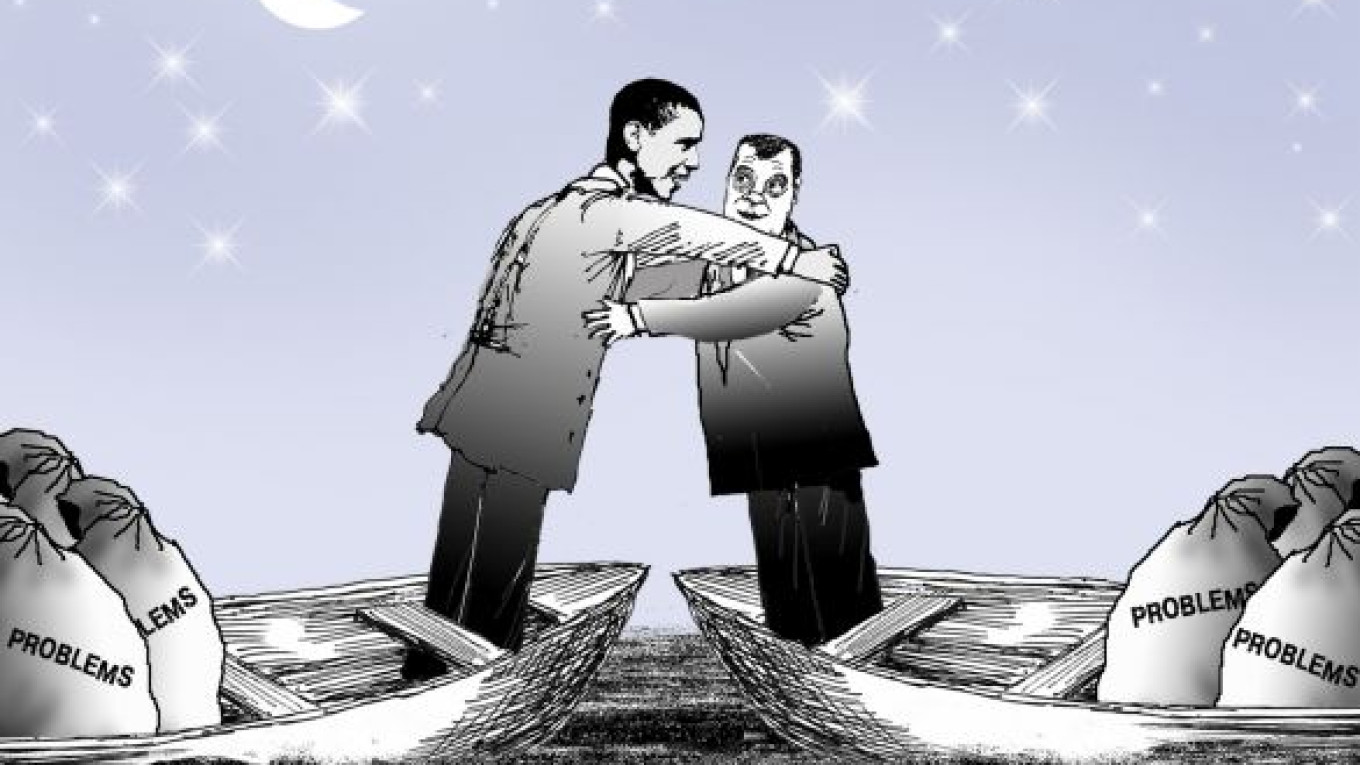Over the past 18 months, Presidents Barack Obama and Dmitry Medvedev have reinvigorated a U.S.-Russian relationship that had become moribund if not downright dangerous in the last year of George W. Bush’s presidency. The signing of the New START treaty in April, increasing cooperation in Afghanistan, and a United Nations Security Council agreement over new sanctions on Iran all testify to the growing rapprochement between Moscow and Washington. Even Russian television commentators of the U.S.-Slovenia World Cup match on Friday agreed that the U.S. team had been robbed of victory by a terrible call by the referee.
The “reset” of U.S.-Russian relations is rolling forward, and the excitement was palpable last weekend at the St. Petersburg International Economic Forum. After years of feeling discriminated against because of strained ties between Washington and Moscow, U.S. companies now believe that the Kremlin is sending the message that it is acceptable for large Russian companies to cut major deals with them. Russian Technologies recently announced the purchase of 50 Boeing 737s for Aeroflot for about $4 billion. Other even larger deals involving U.S. companies will likely be announced soon because the major theme for Medvedev’s visit to the United States this week is to deepen economic cooperation to promote Russia’s modernization.
At the same time, we should think about how this honeymoon can evolve into a stable, long-term marriage rather than the bitter acrimony of the recent past.
There is a widening consensus in the United States that the peak of its unipolar dominance has passed. The global economic crisis accelerated the shifting balance of power to large emerging markets away from the West. A truly multipolar world order will emerge in the course of the first half of this century, and this will present a unique management challenge for the United States, which has only experienced bipolar and unipolar worlds since its emergence as a global power in the last century.
Russia is precisely a partner whose interests Washington must take into greater account, and the Obama administration has done this so effectively that it can point to tangible results.
Russia also faces a unique historical challenge as it finds itself increasingly surrounded by more economically and politically advanced nations. Over the course of centuries, the Principality of Moscow, a small loosely organized state from 1157 to 1389, grew to become the most powerful empire in Eurasia at a time while many of its competitors — from China and Persia to the Ottoman Turks — were in decline. Now the really dynamically developing states in Eurasia — China, India and Turkey — are on the periphery of Russia and Eurasia. And while a nearly 60-year effort to unify Europe under the banner of the European Union is currently mired in one of its ebbs, it will again regain momentum and find its way forward.
With currently less than 3 percent of global gross domestic product, Russia faces a great challenge to maintain — let alone increase — its influence as a regional, much less a global, power.
It is clear from Russian official documents — such as its “Strategic Economic Goals to 2020” plan published two years ago or a Foreign Ministry document leaked to Russian Newsweek last month that calls for the government to adopt a friendlier face to attract foreign investors — that Western partners are crucial to help Russia achieve economic growth and modernization. U.S. administrations under Bush and Bill Clinton both told the Kremlin that U.S. relations in the post-Soviet space were not zero-sum. But Moscow never bought this for many reasons.
While Russian influence has increased after the election of Ukrainian President Viktor Yanukovych, the Obama administration has not reacted in a way that suggests it sees the “pro-Russian” Yanukovych administration as a threat to U.S. interests. This is also the case in Kyrgyzstan, where Washington and Moscow were unsuccessful in containing the violence.
At the St. Petersburg forum, many Russian business leaders asked what will be next on the reset agenda. It is essential that the U.S. Congress ratify the New START, approve a “123 Agreement” that will provide for increased U.S.-Russian cooperation in the civilian nuclear sphere, finally remove the Jackson-Vanik amendment and support Russia’s accession into the World Trade Organization.
Only then will relations truly be reset.
Andrew C. Kuchins is a senior fellow at the Center for Strategic and International Studies in Washington.
A Message from The Moscow Times:
Dear readers,
We are facing unprecedented challenges. Russia's Prosecutor General's Office has designated The Moscow Times as an "undesirable" organization, criminalizing our work and putting our staff at risk of prosecution. This follows our earlier unjust labeling as a "foreign agent."
These actions are direct attempts to silence independent journalism in Russia. The authorities claim our work "discredits the decisions of the Russian leadership." We see things differently: we strive to provide accurate, unbiased reporting on Russia.
We, the journalists of The Moscow Times, refuse to be silenced. But to continue our work, we need your help.
Your support, no matter how small, makes a world of difference. If you can, please support us monthly starting from just $2. It's quick to set up, and every contribution makes a significant impact.
By supporting The Moscow Times, you're defending open, independent journalism in the face of repression. Thank you for standing with us.
Remind me later.


